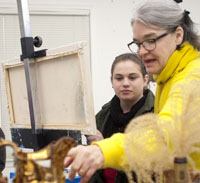Why I Give: Q&A With Stacy DeLano ’71

Stacy DeLano
Q: What is your fondest memory of the College?
A. My lifelong relationship with my major professor, Dr. David Anthony. Although I never really used my Asian studies/political science major professionally, I’ve always had a passion for Asian culture: literature, art, philosophy, cuisine. “Uncle Dave” as we called him, was a larger-than-life academic with a gift of humor and entertainment that made his classes—and interactions with him post-College—more than memorable.
His death in 2000 sparked a self-reassessment of my life when I realized I had been too wrapped up in a stressful and demanding career to focus on family and friends who really mattered to me. I scheduled a visit to David’s widow, Laura—who would become a very close friend until her own death—coupled with some informational interviews that she arranged to explore the possibility of returning to my alma mater to work.
Thus, within a year of those interviews, I was hired as a major gifts officer and made the big switch from corporate life in Washington, D.C., to a nine-year career raising funds for the College.
Q: Why did you choose to support the College with a planned gift?
A. I learned during my years working at the College about the importance of regular, annual giving combined with periodic larger gifts to commemorate reunions or to support capital campaigns. The third leg of giving is an “ultimate gift” that adds to or establishes your legacy.
While working at the College from 2001–2009, I befriended and became “Auntie Stacy” to scores of students, most of whom were internationals, and with some of whom I’ve remained friends to this day. These friendships opened up a whole new world to me and helped to make my life at Randolph a much richer experience, full of joy and purpose.
One of the students I befriended was the late Kobra Ahmadi ’10, a brilliant young refugee from Afghanistan. Her passion for learning, ambition to travel and make a difference, and her determination to be an example to others following in her footsteps was remarkable to me. That she died so young was shattering to the College community, but through her I stayed in touch with her young husband, Jawed Nader, and Susan Lemly Sardina ’70, who had been instrumental getting Kobra to Randolph.
When Afghanistan fell to the Taliban in August 2021, Kobra and her husband’s families were able to escape, and I connected with and became close to the two daughters of her brother, Somaya and Parwin.
Both Somaya’s and Parwin’s dream was to pick up where they left off at university in Kabul. Their ultimate dream was to attend Aunt Kobra’s alma mater. With that inspiration and goal in mind, Susan Lemly Sardina ’70, Susan Braselton Fant ’84, and I teamed up to create a scholarship for displaced and refugee students who could not ordinarily afford the expense of a private liberal arts college.
We managed to raise enough funds to send Parwin to Randolph, where she is flourishing as a first-year student, for one year. The Susans and I will continue to fundraise to get Parwin through to graduation. Then we hope to recruit more qualified students.
It dawned on me in the process of creating this fund that I would be able to endow it through my estate. Since the College was already in my will, it was relatively easy to redirect my intentions to the scholarship in Kobra’s memory. And hopefully it will secure funds to future students for years to come, thus creating my “ultimate gift.”
Q: Do you have any advice for new graduates?
A. Give back. Pay it forward. Someone helped you get through your years at Randolph. From your very first years out, you can make an annual donation that says “Thanks!” and helps another student (or professor, or department, or maintenance of our beautiful campus) live the Vita Abundantior.
My second piece of advice would be to stay in touch. Your college experience will always be one of the most important influences that shapes your life. Being connected to a small institution like Randolph is more than special. Staying in touch with classmates, professors, and—if you can—coming back to celebrate that connection during reunions is infinitely rewarding. What I’ve discovered through the years is that I can easily make friends of grads from other years and professors I didn’t know when I was in college, when I was working for RC, and even now! We have so much in common.
To learn how you can pair your legacy with what you are passionate about, contact The Planned Giving Office at 434-485-8050 or plannedgiving@randolphcollege.edu today. We would be honored to assist you.

